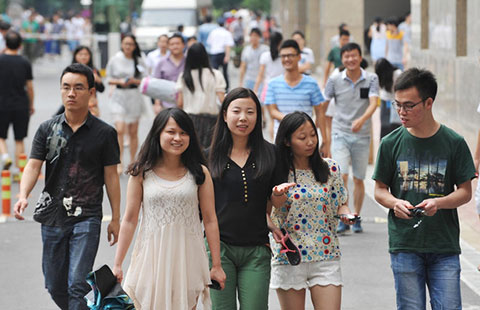History lessons for big powers
By Andrew Moody (China Daily) Updated: 2014-11-03 13:51China, US should brush aside old perceptions for progress, says noted historian
Margaret MacMillan says there are dangers in the United States being too "smug" in response to China's rise.
The internationally renowned Canadian historian contends there are parallels to the buildup to World War I, which also involved a major shift in the balance of power.
 |
| Making water more safe for all |
 |
| China, US 'pragmatic about pact' |
"Established or status quo powers tend to be rather smug and unresponsive to the concerns of rising powers. You see this today with the United States and you saw this with Britain before the First World War."
MacMillan, who was speaking in her office at St Antony's College, Oxford, where she is warden, says, however, that there are also risks to making connections to events in the past.
"You can always make parallels but the thing is not to be trapped by them because nothing in history repeats itself exactly the same.
"Now a hundred years later we have different kinds of communications, different powers, we no longer have empires and so really in so many different ways it is a very different world," she says.
Her latest book, The War That Ended Peace: How Europe Abandoned Peace for the First World War, winner of the international affairs book of the year at the Political Book Awards, however, could be seen as carrying certain lessons for today.
"I think the United States no longer feels quite as dominant as it once was. I think it feels it is overstretched and has got too many responsibilities. A lot of Americans now complain about being asked to be the world's policeman.
"You also have powers that are growing in strength. It is not just China. There are also Brazil and India. How it will play out is anyone's guess. It doesn't, however, mean we are doomed to have another world war."
Some might think MacMillan might have a unique insight into World War I since she happens also to be the great granddaughter of Britain's war-time prime minister David Lloyd George. Her mother who was of Welsh heritage left the UK to go on a schoolgirl trip to Canada in 1939 and never returned.
"It may have given me a sense of history but I never knew him because he died a year after I was born. I never felt the need to defend him in either my latest book or the one on the Paris peace conference.
"I have shifted my opinion of him. I tended to share the common view that he was dodgy and tricky and had no moral principles but I have actually developed a great respect for him."
MacMillan, a very youthful 70, could be described as a late developer. She spent 27 years teaching history at the relatively backwater Ryerson Universty in Toronto, which specialized in vocational-orientated education.
"I taught engineers. They had to do a liberal arts subject. It was a challenge (to keep them interested) and you had to tell them stories and they would always want to know what happened next and that in a way became a technique. It was very useful experience," she says.
Her life was transformed, however, in her late 50s by the dramatic success of Peacemakers: The Paris Peace Conference of 1919, which sold some 240,000 copies and resulted in her being the first woman to win the Samuel Johnson Prize for non-fiction.
- China plans property tax in 2017
- China's Kingsoft challenges office software giants
- China stocks close higher Nov 3
- China eyes on boosting robotics industry
- MASTER app for hobbies, learning & sharing
- Yinlong betting big on electric future
- China October services growth slips to 9-month low, property weighs
- Fountain of ideas
















